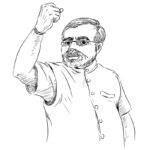IT is like a good-turned-horrific, gold-tinted, but not-so-polished, penny that keeps making its untimely appearances at regular intervals. Ever since the beginning of the year, and India Inc’s frustration with the economic slowdown, the name of India’s super-banker, who has several skeletons too in his vaults, keeps cropping up in mainstream pink media. It is whispered and, therefore, echoes, in the corridors of power. He is the next finance minister (FM), claims the speculative news. He met Prime Minister Narendra Modi to finalise his responsibilities, and discuss India’s fiscal strategy, says another.
Going by the rumours and news items, he should have become the country’s FM at least five-six times. A few weeks ago, when he left the BRICS Bank after the completion of his five-year tenure, there was fresh, but uncertain, talk that KV Kamath, the former ICICI head, was again being considered for the FM’s post. A cabinet reshuffle, said the rumour-mongers, is expected by September 2020, when the COVID-19 lockdown will be completely lifted, and the erstwhile banker was told to be ready so that he could hit the ground running.
It is indeed ironic—and many incidents in Kamath’s life are sardonic—that such buzz about the inevitability of his future post happened during a period, when the banker is on the back foot. In the recent past, two of his banker protégés in ICICI found themselves down in the dumps, with possibilities of being locked up in jail. More importantly, Kamath is under scrutiny for the shenanigans of one of them, whose past, but dizzying, banking career was dictated by her mentor.
Kamath, Chanda Kochhar, the former head of ICICI Bank, and Shikha Sharma, the former top honcho of Axis Bank, are being investigated for corruption, nepotism, and mismanagement. Renuka Ramnath, who managed private equity firm, and Kalpana Morparia, who peacefully retired recently from JP Morgan, are the other protégés, who had their share of controversies. Thus, he and his professional bevy of women are in the news for the wrong reasons, even as he seems to be at the pinnacle of his professional power.
Nepotism charges engulfed and professionally destroyed Kochhar. The CBI alleged that as the head of ICICI Bank she gave huge loans to the Mumbai-based Videocon Group, which turned into bad loans. Curiously, a day after one of the tranches of the loan, worth Rs. 300 crore, was disbursed to Videocon International Electronics, “Venugopal Dhoot (one of group’s promoters) transferred Rs. 64 crore to Nupower Renewable through Supreme Energy, both managed by her (Kochhar’s) husband, Deepak”.
Even more curiously, Nupower Renewable was incorporated a few months before the ICICI-Videocon loan deal. Among its three directors were Deepak Kochhar and Venugopal Dhoot, which hints that it was a form of a joint partnership between a business group and husband of a high-profile banker. However, Dhoot resigned from the company, and sold 1.9 million shares in Nupower Renew-able to Deepak at a face value of Rs. 10 each. However, Kochhar’s husband paid an initial amount of Re 1 per share.
According to CBI, Kamath’s role in these dubious loans to the Videocon Group was of complicity. He was on some of the ICICI committees that sanctioned Rs. 3,250 crore to the Mumbai-based group, which included the Rs. 300 crore mentioned above. “These loans have turned NPA resulting in wrongful loss to ICICI Bank, and wrongful gain to borrowers and accused persons. The role of these senior offic-ers (including Kamath) of the sanctioning committee may also be investigated,” said the CBI probe report.
SUBSEQUENTLY, Kochhar was disgracefully removed from ICICI Bank. An internal probe panel, which was headed by a retired judge, found her guilty, and she was sacked. Based on the findings, the bank “decided to take back all bonuses given to her between April 2009 and March 2018, and also revoke all benefits and stock options”. The panel concluded that Kochhar was unable to deal with issues related to “conflict of interest and due disclosure of recusal requirements” in the bank’s dealings with the Videocon Group.
However, the links between Kamath and Kochhar are deep-rooted and go back a long way. In 2009, when he was an established name, and decided to step down as the ICICI head, his four women stood a fair chance to grab the coveted post. Kochhar got the job, which angered the others, who felt that they were equally talented, if not more than her. Once she was at the helm of affairs in May 2009, it was inevitable that the move would lead to the inevitable exits of the other women competitors.
It happened sooner than expected. Sharma and Ramnath immediately left to redraw their new destinies—the former landed at Axis Bank, and the latter launched a private equity firm. Morparia, the more sober of the quartet, retired as ICICI director, and had a peaceful stint at JP Morgan. The trio’s final trajectories were somewhat different—recently, Sharma was asked to leave, Morparia gracefully retired, and Ramnath successfully and profitably sold her firm’s stakes in nine of the 11 ventures it had funded.

Given the current controversies at Axis Bank, and the manner in which Sharma exited from the bank, this is a more intriguing story, which implicates and engulfs Kamath indirectly. In the recent past, the Serious Fraud Investigation Office summoned Sharma to seek information on how the controversial Nirav Modi and Mehul Choksi borrowed Rs. 12,600 crore from a clutch of banks, including Axis Bank, without proper documents. The duo flew out of the country around the time the scam broke out.
Sharma’s bank extended Rs. 700 crore without the verification of the Letter of Undertaking (LoU), a form of bank guarantee, furnished by the borrowers. The LoU turned out to be a fake, as did the other documents deposited by the duo at the other banks. Other senior bankers of Axis Bank were called by the SFIO, apart from those in 30 other banks. The Modi’. Choksi episode reeks of gross mismanagement, and the lack of checks and balances. There were other incidents that put Axis Bank in the dock.
The National Company Law Tribunal wishes to know how Ramesh Chandra Bawa, a key official of the IL&FS Group, which went bankrupt recently, and his family members were allowed to withdraw money from their bank accounts, and assets from their lockers, both in Axis Bank, even after the tribunal froze them. The Enforcement Directorate is interested how the bank was involved in the modus operandi by which a cooperative society illegally transferred Rs. 2,000 crore abroad through shell companies.
Kamath, Chanda Kochhar, the former head of ICICI Bank, and Shikha Sharma, the former top honcho of Axis Bank, are being investigated for corruption, nepotism, and mismanagement. Renuka Ramnath, who managed private equity firm, and Kalpana Morparia, who peacefully retired recently from JP Morgan, are the other protégés, who had their share of controversies
Bankers and observers contend that Sharma’s tenure as the head of Axis Bank – from 2009 to 2018 – was one of the worst in recent banking history. “Not only was the performance of the bank pathetic in her final years, she was responsible for a culture that promoted marketing that led to poor operational risk controls, and lapses in Know-Your-Customer protocols. The bank was involved in money laundering during demonetization,” claims Hemindra Hazari, a registered research analyst.
Who is Kamath?
SINCE 1996, when he returned from his stint in Asian Development Bank to head ICICI Bank, Kundapur Vaman Kamath was acclaimed as the country’s super-banker with concrete links with India’s politics, and within India Inc. His banking prowess is proved by the fact that in the 1990s, he quickly grasped the concept of ‘universal banking’. To expand and thrive in the post-reforms era, a bank had to exit its project-finance mindset, i.e. fund private and state projects, ad get into other areas.Two areas that appealed to Kamath in the late 1990s and 2000s were infrastructure – a growing middle and aspiration class would demand better roads, highways, airports, etc – and retail – a consumption boom would follow as Indians had more money to spend on houses, cars, and consumer goods. He was bang on the spot and, during his tenure as ICICI head between 1996 and 2009 the bank’s assets grew from a mere Rs. 21,000 crore to an unimaginable Rs. 380,000 crore – 17 times in 14 years.

In the 2000s, India Inc celebrated Kamath as its poster boy. The latter represented the business community’s views on finance, manufacturing, and other policies to make India’s a global hub. No strategy meeting among businesses, especially at the national level, was complete without the super-banker. Kamath found himself as a member of several committees that prepared a futuristic blueprint for the Indian economy. His stature within India Inc, and among family businesses, was most visible in 2005.
When the two warring Ambani siblings, elder Mukesh and Anil, decided to split the business empire in less than three years after their father’s (Dhirubhai) death, Kamath was the brothers’ “mutually-agreed arbitrator”. More importantly, this was known publicly, and was reported in the media. It showed the banker’s power and influence that India’s first business family, the richest and wealthiest, had approached him to sort out its personal affairs. He was regarded more as a family member by the Ambani clan.
Kamath’s brush with politics started quite early, when his father entered politics and became the Mayor of Mangalore. When he returned to ICICI in the mid-1990s, he assiduously built his political contacts. He was known to be close to several prime ministers and finance ministers from both sides of the political fence. It was, therefore, not surprising that his proximity with Congress’ P. Chidambarm didn’t dissuade the Modi regime to appoint him as the head of the BRICS Bank for a period of five years.
Now, Kamath has returned back from another foreign stint. The last time, he took over as the head of ICICI Bank; this time, will it be as the nation’s financial head—the finance minister of India?
HE adds that if anyone raised a voice internally against such malpractices, he or she was promptly silenced. This is evident from the manner in which Axis Bank dealt with whistle blowers. They were persecuted and shunted out. “The bank used the draconian ‘Clause 3.5 of the Bank’s Staff Rules’ that enables it to terminate any employee without a reason. Such whistle blowers were, obviously, unable to find employment elsewhere. Thus, employees were indirectly warned that they could not point out regulatory lapses.”
Although Sharma left in 2018, the bank has tottered financially because of her corrupt legacy. In the last quarter, it incurred a huge loss of Rs. 1,388 crore, which was in contradiction to the market estimate of a profit of Rs. 1,478 crore. Obviously, the culprit was the provisioning of a whopping Rs. 7,730 crore for future non performing assets. The bulk of these included loans to MSMEs, which were disrupted by government policies like demonetization and GST, and health disasters like Covid-19.
Clearly, the RBI was aware that Sharma’s tenure had taken the bank to the edge of a financial abyss. The turnaround was possible only if she was forced to go, and a new person was appointed in her place. By December 2017, Axis Bank’s bad loans soared more than five times to 5.28 percent, compared to the 1.01 percent when Sharma joined it. In 2015-16 and 2016-17, the RBI discovered that the mismatch between the actual NPAs, and what were declared by the banks, were Rs. 9,400 crore and Rs. 4,800 crore, respectively.

Hence, it wasn’t surprising that Sharma’s exit was bizarre. In July 2017, she was recommended for a three-year re-appointment by the bank’s board, which was effective from July 2018. But given the state of financial affairs, it is reported that the central bank intervened, and urged the bank to reconsider its decision. It wasn’t unusual that Sharma announced that she would wish the three years to be reduced to seven months, i.e. until December 2018. It was a face-saver. As usual, the RBI agreed to such an option.
Unlike Kochhar and Sharma, Ramnath and Morparia maintained their professional statures. But the latter two too were involved in past controversies when they were part of the ICICI Group. Morparia was actively involved in one of the turnaround strategies of Dabhol Power, a contentious power company that was promoted by the US-based Enron, which went belly-up due to corruption, mismanagement, and doctoring of financial accounts. As many other such moves, this turnaround failed after a few years.
The links between Kamath and Kochhar are deep-rooted and go back a long way. In 2009, when he was an established name, and decided to step down as the ICICI head, his four women stood a fair chance to grab the coveted post. Kochhar got the job, which angered the others, who felt that they were equally talented, if not more than her. Once she was at the helm of affairs in May 2009, it was inevitable that the move would lead to the inevitable exits of the other women competitors
As Sharma got ready to quit ICICI Ventures, she was embroiled in a legal spat with the Azim Premji Group. The latter charged that the private equity wing of ICICI sold shares of Shubiksha, a physical retail chain, just before it keeled over. Sharma denied the accusations, and maintained that there was nothing wrong with the financial health of Shubiksha, which went into turmoil because of its inability to raise adequate cash. There was an agreement, which left Sharma to blaze a new path in private equity circles.

In lieu of this background—Kamath and two of his women protégés are embroiled in recent scandals, and two had not-so-squeaky clean past, a few media reports have questioned if Prime Minister Modi will appoint such a controversial person as the new FM. It is known that Modi is extremely careful and cagey about his image, and tries to distance himself from scams. In fact, he tries to monitor and regulate senior cabinet ministers, especially those whose family members are involved in businesses.
SUCH articles speculate that there may other reasons why Kamath’s name crops up at regular intervals. One of them is to make sure that he never gets the coveted post. In the past, it was revealed that if a person’s name was mentioned in the media for a specific job, it was instantly scuttled by their enemies. The second is that some of the stories that mentioned Kamath’s name were published by an entity that was close to a Mumbai-based businessman, who has several scores to settle against Kamath.
Unlike Kochhar and Sharma, Ramnath and Morparia maintained their professional statures. But the latter two too were involved in past controversies when they were part of the ICICI Group. Morparia was actively involved in one of the turnaround strategies of Dabhol Power, a contentious power company that was promoted by the US-based Enron, which went belly-up due to corruption, mismanagement, and doctoring of financial accounts
However, as we know, Kamath has the uncanny ability to land himself at the right spot at the right time. He was there to emerge as India’s super-banker in the 2000s. Despite his close connections with the Congress, the current prime minister appointed him to head the BRICS Bank, which was an important post in the international finance arena. Now that he is back, who knows what he can conjure, what rabbit he can pull out of his hat? It is easy to write off Kamath; it isn’t easy to write him off for a long time.



























































